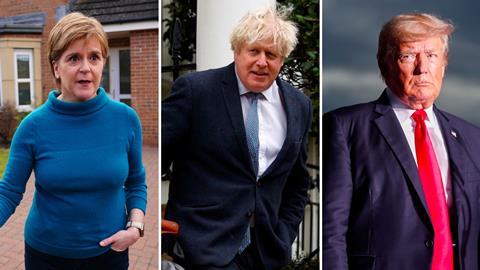Nicola Sturgeon has been arrested. Boris Johnson has resigned as an MP and Donald Trump has been indicted. The murky world of politics may be mucky, but only by being involved can Christians clean it up, says Tim Farron

Politics has gone crazy…again!
Boris Johnson has dramatically resigned as an MP ahead of a damning report by the Commons Privileges Committee into whether he knowingly misled Parliament over the Partygate affair. Former Culture Secretary, Nadine Dorries, and another ally, Nigel Adams, also resigned, kicking off – as things stand – three by-elections at a time when the Conservatives are doing dreadfully in the polls.
Elsewhere, former US President Donald Trump has been indicted with 37 criminal counts for allegedly mishandling classified documents, and former SNP Leader Nicola Sturgeon was arrested in connection with an investigation into mishandling of the party’s finances.
Politics gives us a chance to put his love for us into practice by loving and serving others
All in all, these events certainly vindicate the title of my weekly podcast (and book of the same name) - politics continues to be a thoroughly mucky business!
We could spend days delving into the details of these events and emphasising the importance of Christian values such as integrity, justice and forgiveness, but I have already said similar things in response to the Boris Scandals part one, two and three, and I’m not convinced anyone needs to hear them again.
Get stuck in
Instead, I want to think about why, despite all the muck, Christians should still be getting stuck into politics. And many are. Last week on the ‘Mucky Business’ podcast, I spoke to Labour Parliamentary candidate David Lawrence and, over the coming weeks, I’ll be interviewing Christian candidates from the Conservative and Liberal Democrat parties who all who feel called by God to become MPs.
So let’s remind ourselves why Christians still need to engage with politics.
Firstly, it is helpful to remember that God is bigger than parliament. The Bible is not a manifesto. Christians are not called to sign on the dotted line and pay our membership fee. Political ideologies can help us make sense of the world and give us an approach for organising society – and political parties are vehicles for putting these ideas into practice - but, ultimately, politics cannot save us.
By contrast, becoming a Christian tells us that we do not belong to ourselves. Instead, we are all joined to God’s greater story of redemption and salvation for the whole world. God’s plan is not a vague, distant or abstract one. He promises to redeem all things one day, not by whisking us away to live on a cloud, but by bringing together a new heaven and a new earth. He did not withdraw from the mess that we have made of his world, and neither should we.
Serving self-sacrificially
Isaiah 59:15-16 says: “the Lord looked and was displeased that there was no justice…He was appalled that there was no one to intervene.” So God intervened himself in bodily form. Through Jesus, he chose to enter into the world and act from within it to put all things right.
In the Gospels we see that Jesus came to save souls, but also that he healed, fed and cared for people’s physical needs. The New Testament regularly speaks of Jesus’ compassion for people’s physical and emotional wellbeing as well as for their spiritual situation.
As Jesus came to serve, we are also called to serve others, and with the same attitude of faithfulness, compassion and self-sacrifice.
Through politics, we serve God - by serving others in our communities and beyond, and by our conduct in the public square. Society needs leadership. Governments have to exist and politicians follow some kind of ideology to come to decisions. All of this is imperfect, but if we don’t show up and have a say in the decision making, we are effectively abdicating responsibility for who governs us and how.
We aren’t called to despise or fear others, we are called to reflect God’s amazing grace
There is no such thing as neutrality in politics. Everyone brings their values and views to the table, whatever they might be. If Christians step away from this conversation, we will find that the decisions are entirely made by others on our behalf.
Engage in grace
But as I frequently say – to remind myself as much as others – we shouldn’t be engaging in a belligerent or aggressive manner. We aren’t called to despise or fear others. Instead we are called to stand in God’s amazing grace and reflect that in all our attitudes and actions.
The gospel is incredible news. We are secure for eternity if we trust in Jesus. And we have a joyful and revolutionary hope that what we do now really does echo in eternity. It is because of this that we can afford to love, give and care generously for those around us.
Therefore, as we seek to live in relationship with the God of the universe, politics gives us a chance to put his love for us into practice by loving and serving others.
It calls for us to show grace towards others as God has been gracious to us, and to “love because he first loved us” (1 John 4:19).
By this, we aim to show a better way - and hopefully clear away some of the muck in the process!





































No comments yet